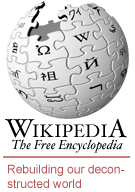Like most students who dabbled in postmodern theory during college, I came away with a certain skepticism towards “truth,” yet managed to emerge with a belief — call it faith — that Truth was still out there. Stanley Fish offers a plot summary of the story so far in todays’ Times. As a practical matter, Fish observes, most of us did not dwell in the valley of doubt, but have tried to square postmodern analysis with our modernist commitments. He writes, “We can still do all the things we have always done; we can still say that some things are true and others false, and believe it; we can still use words like better and worse and offer justifications for doing so. All we lose (if we have been persuaded by the deconstructive critique, that is) is a certain rationalist faith that there will someday be a final word, a last description that takes the accurate measure of everything.”
 Fish may as well be describing Wikipedia, for Wikipedia exemplifies the quest for truth in a deconstructed world. Wikipedia harnesses individuals’ faith in truth, yet ultimately tempers it within a fundamentally relativist framework. Wikipedia ultimately guarantees not so much the truth as the ability to argue for the truth by appealing to a common cultural understanding — the Neutral Point of View — as the final arbiter of truth. In short, Wikipedia resolves the postmodern dilemma of truth by ultimately relying on process. Through the give-and-take between many committed individuals who hold strong beliefs in what is true, as well as a common commitment to what truth means, a truer (or truthier) encyclopedia of knowledge emerges.
Fish may as well be describing Wikipedia, for Wikipedia exemplifies the quest for truth in a deconstructed world. Wikipedia harnesses individuals’ faith in truth, yet ultimately tempers it within a fundamentally relativist framework. Wikipedia ultimately guarantees not so much the truth as the ability to argue for the truth by appealing to a common cultural understanding — the Neutral Point of View — as the final arbiter of truth. In short, Wikipedia resolves the postmodern dilemma of truth by ultimately relying on process. Through the give-and-take between many committed individuals who hold strong beliefs in what is true, as well as a common commitment to what truth means, a truer (or truthier) encyclopedia of knowledge emerges.
Wikipedia’s emphasis on process puts into action theories laid out by philosophers who have tried to slip the noose of relativism, from Rawls’s theory of justice to Habermas’s theory of communicative action. Taken to the extreme, a reliance on formal process leads to the kinds of absurdities we’ve seen newspapers engage in when they present “both sides” of a scientific controversy rather than emphasize empirical findings. But the blame for such pathologies lies not in postmodernism itself, which merely revealed to us that power shapes “truth,” but rather in journalism’s failure to evolve its cultural understanding of truth.
Thus, Wikipedia is best understood as a cultural practice (the NPOV) rather than mere technology (the wiki). What’s more, it’s a cultural practice that, by adopting a postmodern superstructure, puts into service the power and energy of modernist conflicts. Nothing can guarantee truth or accuracy — neither the wisdom of the crowds nor elite editors. But the key to Wikipedia’s thriving is that its process is both open and transparent. The levers of power are not destroyed (Foucault taught us that this is impossible) but simply visible. So long as Wikipedians feel they have access to those levers and a faith that “the process works,” a more perfect truth — but not a perfect Truth — will continue to emerge.
Update: Got an email from Jimmy Wales himself, in which he notes (after the jump)…
Continue reading ›
 Fish may as well be describing Wikipedia, for Wikipedia exemplifies the quest for truth in a deconstructed world. Wikipedia harnesses individuals’ faith in truth, yet ultimately tempers it within a fundamentally relativist framework. Wikipedia ultimately guarantees not so much the truth as the ability to argue for the truth by appealing to a common cultural understanding — the
Fish may as well be describing Wikipedia, for Wikipedia exemplifies the quest for truth in a deconstructed world. Wikipedia harnesses individuals’ faith in truth, yet ultimately tempers it within a fundamentally relativist framework. Wikipedia ultimately guarantees not so much the truth as the ability to argue for the truth by appealing to a common cultural understanding — the 
